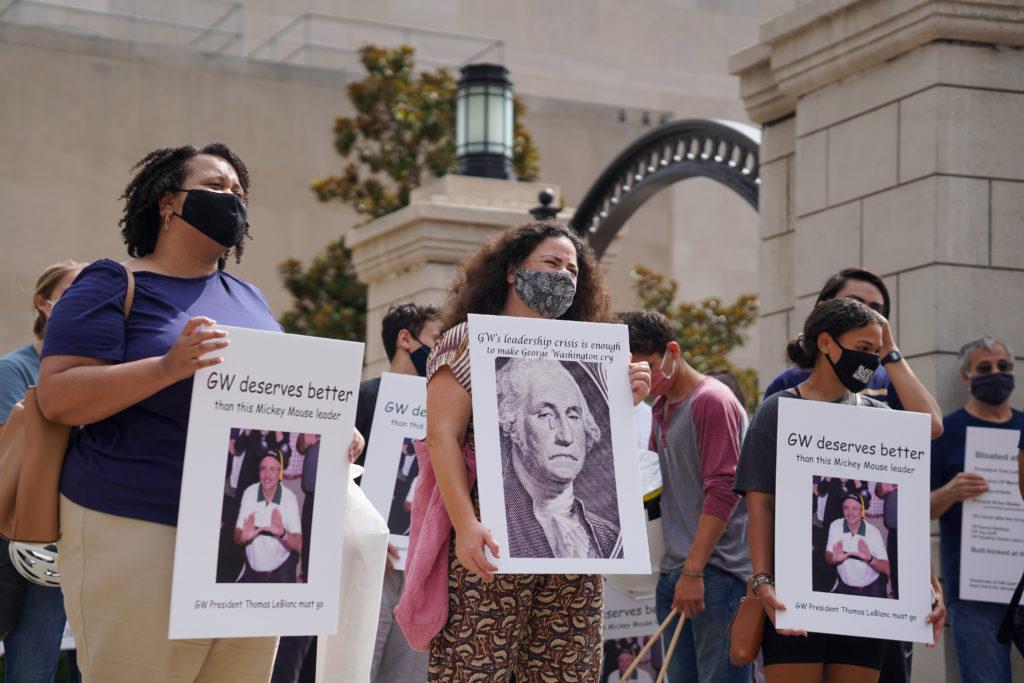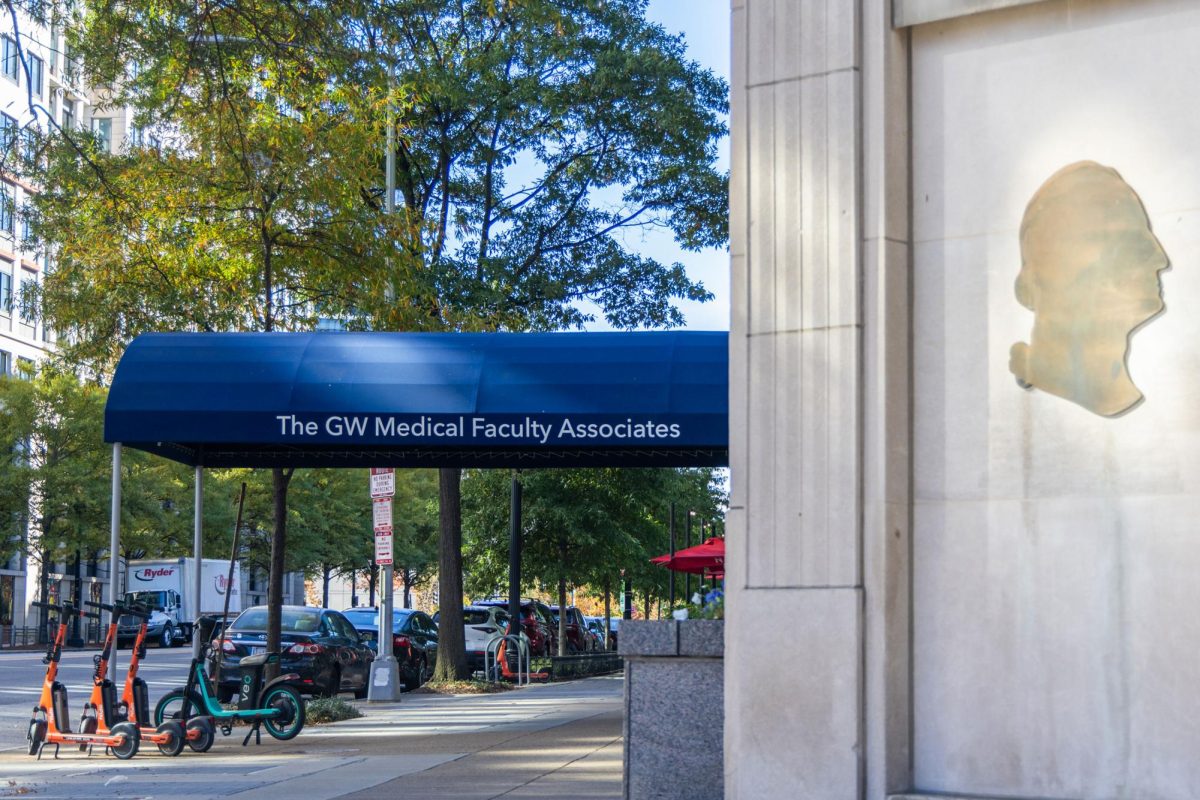Liberal arts faculty who disapproved of University President Thomas LeBlanc’s leadership welcomed his retirement announcement last week.
A dozen liberal arts professors said LeBlanc’s presidency has been troubled with numerous controversies, like his now likely “obsolete” 20/30 plan to increase STEM enrollment at GW, which sparked concerns that the plan would come at the expense of non-STEM programs. They said they hope the incoming president and the Board of Trustees will collaborate more with faculty on a shared vision for the University that will restore and enhance GW’s reputation.
LeBlanc announced his intention to retire at the end of the upcoming academic year last week, saying his presidency was “disrupted” by the COVID-19 pandemic. He said GW needs a successor who can focus on the University’s long-term goals as it transitions back to in-person operations.
Both LeBlanc and Board Chair Grace Speights declined to comment about LeBlanc’s retirement and the Board’s next steps in the search for a new University president. University spokesperson Crystal Nosal said the Board has begun discussing the search process.
Kathryn Kleppinger, an associate professor of french and francophone studies and international affairs, said LeBlanc’s retirement announcement signaled to faculty who opposed his leadership over the past few years that their voice was finally heard. She said LeBlanc’s biggest failure was his inability to listen and consider concerns from faculty, staff and students who questioned his vision, adding that “dictating” is not the way to win people over at an institution.
“In a twisted way, I think he has actually made the faculty more unified than we were before he came, but he unified us against him,” she said. “He did kind of make GW great again in that sense where I see faculty who are truly engaged in the fight for the soul of GW, and he inspired us to do that by being so incredibly dismissive.”
Kleppinger, who is the treasurer and secretary of the GWU Faculty Association, which has been highly vocal in their criticisms of LeBlanc, said she looks forward to and remains optimistic in working with a new president. She said she hopes LeBlanc’s presidency will serve as a “cautionary tale” for future leaders to engage with the rest of the GW community on their goals and plans.
“One of the mantras of the Faculty Association over the past year has been ‘GW deserves better,’ precisely because we genuinely feel that GW is worth it, and it’s worth the fight because we are so committed to the institution,” she said.
Tensions between faculty and LeBlanc have escalated throughout the academic year, culminating in faculty-wide survey indicating a loss of confidence in LeBlanc’s leadership abilities.
Hope Harrison, a professor of history and international affairs, said she was surprised by LeBlanc’s departure, but his decision was a “huge relief” for her. She said she’s relieved he is leaving GW because of his “sidelining” of the humanities combined with an overt focus on STEM fields under his strategic plan and the controversial hiring of Heather Swain last year.
“He’s brought such negative publicity to the University,” Harrison said. “I can’t say enough how demoralizing it’s been to be a faculty member who puts everything into my job as a professor and to feel that the person at the top is sort of bringing us all down.”
Harrison said she hopes the Board will create a diverse search committee for a new president with representation from both the humanities and social sciences. She said the new University president should have an understanding of the “diverse offerings” at GW, a “moral compass” and an interest in working with faculty.
Andrew Zimmerman, a professor of history, said they were surprised about LeBlanc’s retirement announcement because they believed the Board was unlikely to remove him from leadership. They said LeBlanc has had a “shameful” record at GW because he disregarded the University community’s objections, like criticism of the Disney Institute culture survey, the Faculty Assembly’s request for more data on his strategic plan and the hiring of new senior administrators— instead eliminating staff positions and freezing salaries at the onset of the coronavirus pandemic.
Zimmerman, who is the Faculty Senate and staff liaison for GWUFA, said they hope the Board will recognize its responsibility to act on behalf of the entire GW community and institute reforms that will restore shared governance norms following LeBlanc’s retirement. They said the Board and the eventual presidential search committee need greater representation from academics to guide GW forward, especially in light of Speights’ recent message to faculty that carried a “threatening” and “bullying” attitude about shared governance.
“On the one hand I’m really glad that he’s gone,” Zimmerman said. “But on the other hand, the Board that stood by him continues to double down on that same kind of ineffective style of leadership, rule, domination and intimidation.”
But Steve Charnovitz, a professor of law and the Faculty Senate’s former parliamentarian, said LeBlanc has been a positive “reformist” during his time at GW, and the senate has been “unprincipled” in its actions against the president. He criticized the senate’s recent faculty survey on LeBlanc’s leadership and the special resolution voicing “serious concern” about him.
He said the president will be remembered for trying to fix intractable problems within the University, like solutions offering more opportunities in STEM fields, but faced enormous opposition from faculty resistant to both change and competition in higher education. He said he hopes for a “ceasefire” and cooperation again between the faculty and administrators in search of a new president to prevent further damage to the University’s reputation stemming from the clashes between the two.
“It’s been a very disappointing year for the colloquy about the University, and I’m sure that there is just kind of a disorderly, ornery, uncivil attitude by many faculty that will be noted by those in histories that are still to be written,” he said.











